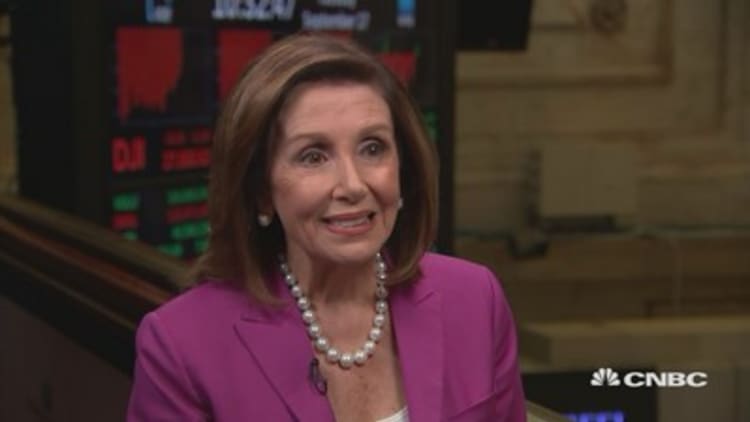Elizabeth Warren aims to transition the U.S. to "Medicare for All" in her first term, moving to the single-payer health-care system through two pieces of legislation, her campaign said.
In a proposal outlined Friday, the Warren campaign said the 2020 Democratic presidential hopeful would take several steps in her first 100 days to expand insurance coverage. The Massachusetts Democrat would push to pass a bill to allow all Americans to either buy into Medicare for All or get covered for free through special budget rules that would only require a simple majority vote in the Senate.
She wouldn't move to eliminate private insurance until her third year, when Warren hopes to pass another measure to fully transition to Medicare for All.
The senator outlined the two-bill path to government-run health care as she and the leading proponent of Medicare for All, Sen. Bernie Sanders of Vermont, face backlash for supporting the elimination of employer-based insurance. It also sets Warren apart from Sanders, whose single-payer legislation would set up a national insurance program over four years.
With less than three months to go until 2020 primary nominating contests start in Iowa, Democrats have disagreed more about the best way to expand health coverage and cut costs than about any other issue. Leading candidates such as former Vice President Joe Biden and South Bend, Indiana, Mayor Pete Buttigieg have supported some kind of public health-care option, criticizing Medicare for All as too expensive and impractical.
Warren's proposal released Friday appears to set up a more gradual transition than she previously supported in Sanders' plan. Though using budget reconciliation would make it easier for Warren to pass Medicare for All, she will still face obstacles in trying to get the plan through Congress.
Even if Democrats can win back a narrow Senate majority next year, some of the party's more centrist members could oppose a transition to a single-payer plan. She could also face opposition in passing the second piece of legislation to end employer-based coverage, as even many Democrats have resisted scrapping private insurance.
The bill Warren aims to pass in her first 100 days would set up an insurance option that would cover benefits such as primary and preventive services, vision, dental and long-term care, and mental health and substance treatment. It would provide free coverage for children under the age of 18 or any American earning up to 200% of the federal poverty level, which the campaign defined as about $51,000 for a family of four.
Others can choose to buy into the plan instead of private insurance, and coverage will eventually become free for everyone, the campaign said.
Warren outlined other actions for her first 100 days in office. She wants to pass anti-corruption reforms to rein in lobbying by pharmaceutical companies.
She plans to take executive action to reduce drug costs and end short-term so-called junk insurance plans. Warren would also reverse the Trump administration's decision not to defend the Affordable Care Act, commonly known as Obamacare, in court, among other actions.
Warren had faced skepticism about how she would pay for a Medicare for All system without raising taxes for middle-class Americans. Both she and Sanders have typically said the proposal would reduce the overall burden on the middle class by cutting health-care costs.
Warren put out a funding plan earlier this month, pledging she would implement Medicare for All with "not one penny in middle-class tax increases." She said she would raise taxes on wealthy Americans, corporations and financial firms, among other changes, to cover $20.5 trillion in new federal spending.
Sanders suggested to CNBC that he would not outline how he would pay for his health-care plan.
Warren's rivals who have not embraced Medicare for All piled on her plan after its release Friday. Biden campaign spokeswoman Kate Bedingfield argued the senator has "discovered how problematic her embrace of Medicare for All has become" and is "now trying to muddy the waters even further."
Buttigieg spokeswoman Lis Smith also called it a "transparently political attempt to paper over a very serious policy problem, which is that she wants to force 150 million people off their private insurance- whether they like it or not."
The dispute will almost certainly resurface during Wednesday's presidential primary debate in Atlanta.



